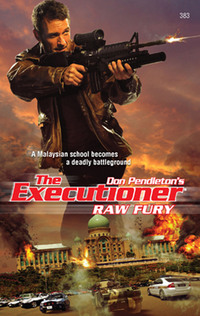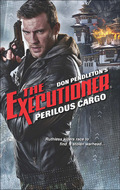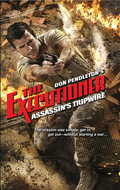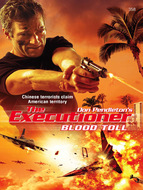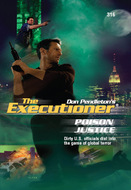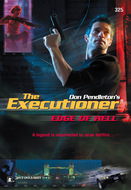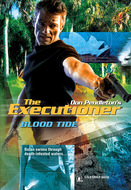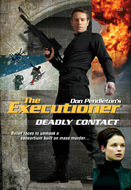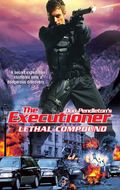Kitap dosya olarak indirilemez ancak uygulamamız üzerinden veya online olarak web sitemizden okunabilir.
Kitabı oku: «Raw Fury»
A grenade bounced down the alley toward them
Without hesitating, Rosli stepped forward and planted a firm toe-kick with impeccable accuracy. The grenade whipped back the way it had come.
“Down!” Bolan ordered.
They hit the deck. The grenade exploded in the alley mouth. Bolan counted to three, his ears ringing from the blast, then surged up with the Beretta 93-R in both hands.
He advanced on the alley mouth. The bodies of the shooters he and Rosli had already killed were splayed in gruesome wreckage, torn by the explosion. Bolan had seen enough carnage in his lengthy personal war that the sight did not unnerve him, but he would never truly be used to it; no sane human being ever became completely inured to death and destruction. The Executioner simply did what he had to do, and took in measured stride the dead men he left in his wake—men who tried to take his life, or the lives of good men, women and children. If at some time Mack Bolan was held to account, if his tally were to be judged, he would stand unafraid before whatever power that might be.
But that day of judgment would not be this day.
Raw Fury
The Executioner®
Don Pendleton

They have not wanted peace at all; they have wanted to be spared war—as though the absence of war was the same as peace.
—Dorothy Thompson
1893–1961
It has been said that if you want peace, you must prepare for war. To be prepared for armed conflict is not enough, however. To live in peace, we must have the will to fight.
—Mack Bolan
THE MACK BOLAN LEGEND
Nothing less than a war could have fashioned the destiny of the man called Mack Bolan. Bolan earned the Executioner title in the jungle hell of Vietnam.
But this soldier also wore another name—Sergeant Mercy. He was so tagged because of the compassion he showed to wounded comrades-in-arms and Vietnamese civilians.
Mack Bolan’s second tour of duty ended prematurely when he was given emergency leave to return home and bury his family, victims of the Mob. Then he declared a one-man war against the Mafia.
He confronted the Families head-on from coast to coast, and soon a hope of victory began to appear. But Bolan had broken society’s every rule. That same society started gunning for this elusive warrior—to no avail.
So Bolan was offered amnesty to work within the system against terrorism. This time, as an employee of Uncle Sam, Bolan became Colonel John Phoenix. With a command center at Stony Man Farm in Virginia, he and his new allies—Able Team and Phoenix Force—waged relentless war on a new adversary: the KGB.
But when his one true love, April Rose, died at the hands of the Soviet terror machine, Bolan severed all ties with Establishment authority.
Now, after a lengthy lone-wolf struggle and much soul-searching, the Executioner has agreed to enter an “arm’s-length” alliance with his government once more, reserving the right to pursue personal missions in his Everlasting War.
Contents
Chapter 1
Chapter 2
Chapter 3
Chapter 4
Chapter 5
Chapter 6
Chapter 7
Chapter 8
Chapter 9
Chapter 10
Chapter 11
Chapter 12
Chapter 13
Chapter 14
Chapter 15
Chapter 16
Chapter 17
1
Mack Bolan felt sweat bead on his chest and under his arms as the tropical heat of Kuala Lumpur struck him with palpable force. Temperatures were up slightly, according to the canned news reports televised in the main terminal, but while Bolan found the high nineties a bit on the warm side, it wasn’t unbearable. The change was a shock after the air-conditioning of the airport, but the day’s highs would not vary much in the city’s year-round equatorial climate. If the operation went as planned, for that matter, he wouldn’t be in Malaysia long enough to care.
He was glad to leave the frustrating congestion of the airport and picked up his pace accordingly. Glancing at his watch, he verified that he was still on schedule. The operation was tight, because it had to be. He had been aware of the numbers falling for the entire flight from the United States.
Bolan was dressed for the climate in a pair of tan cargo pants, lightweight hiking boots and a loose, short-sleeved khaki shirt that billowed about him in the humid breeze. It was bright outside the terminal; he took a pair of mirrored, aviator-framed sunglasses from his shirt pocket and put them on.
The man known to some as the Executioner ignored the insistent clerks behind the taxi counter, knowing that other arrangements had already been made for him. Bolan allowed himself a small, tight smile as he imagined their dismay. He was no stranger to the taxi scams outside Kuala Lumpur’s International Airport, or outside the airports in dozens of other countries around the globe. Had he been left to his own devices, the Express Rail Link might have been an option, but he’d been warned to avoid that, too.
Outside the terminal, a line of taxis waited. Bolan glanced at his watch again. It was exactly two in the afternoon.
As if on cue, a battered, livery-marked Hyundai separated itself from the queue and roared around the lead vehicle to stop directly in front of Bolan. The car was dragging its muffler behind it, but the driver seemed not to notice. Behind him, the cabbie whose fare had just been stolen leaned on his horn, shouting a stream of what were probably profanities. Bolan did not speak the language but assumed it was Malay. Then the driver switched to English, leaving no doubt in the soldier’s mind as to the man’s intentions. Bolan remembered something from the tourism pamphlets on the flight; English was taught commonly in Malaysian schools.
“Get in, get in,” the driver said, leaning toward the open passenger window. “Your friend Hal says hello.”
Bolan got into the passenger seat. The taxi growled as the driver put the accelerator to the floor, causing the little car to shudder and buck as it pulled away from the outraged cabbie in the rearview mirror.
“And you are?” Bolan raised an eyebrow as his driver pushed the Hyundai through the dense city traffic, cutting off other drivers with reckless abandon.
“You may call me Rosli,” he said. His English was excellent, with just a hint of an accent. “You are Mr. Cooper, yes?”
“Yes,” Bolan nodded. Matt Cooper was a cover identity he frequently used.
Rosli was of slight build, with a shaved head and a dark complexion. Deep laugh lines made him look older than he probably was. He wore a pair of lightly tinted, round sunglasses, a loose, beige, short-sleeved shirt and a pair of knee-length shorts. Bolan caught a glimpse of his sandaled feet as the man tromped the accelerator for all he was worth.
They drove in silence for a while, Bolan taking in the cityscape. He could see the glass-shelled Petronas Towers in the distance, at one time the tallest buildings in the world. The city was a mix of modern and post-modern architecture, with a healthy dose of nineteenth- and twentieth-century Colonial mixed in.
“I am surprised,” Rosli said finally, “that you are so trusting. I was led to believe you were…a dangerous man. How do you know I am not sent to, what is the word…waylay you?”
“If you were,” Bolan said casually, “I’d kill you, take the wheel and use the curb to bring the car to a stop.”
Rosli opened his mouth to say something, caught something in Bolan’s expression and thought better of it. Finally, he laughed. “Fair enough, Mr. Cooper,” he chuckled. “Fair enough. I do believe you would, too.”
Bolan did not comment.
“We will be at the school within ten minutes, depending on the traffic,” Rosli said, darting around a small panel truck. “There is no time to waste. Your airdrop could not have come too soon.”
“I wouldn’t call a commercial flight an air drop,” Bolan said.
“First class,” Rosli said, “and faster than we could have arranged a charter.”
“Luck,” Bolan said.
“Providence,” Rosli said with a grin. “And therefore the same thing. Regardless, we shall have you in place as quickly as possible, which is not soon enough. You will find what you requested under your seat. You will be pleased to see that everything is there. It was not easy. Your request was very specific. Very difficult.”
Bolan nodded. He reached under the passenger seat to retrieve the olive-drab canvas messenger bag hidden there. He put it on his lap, below the level of the passenger-side windowsill, and inspected the contents.
The bag contained a Beretta 93-R machine pistol. There was also a stainless steel .44 Magnum Desert Eagle. A sound-suppressor and a leather shoulder-harness rig for the Beretta, several loaded magazines and a KYDEX inside-the-waistband holster for the Desert Eagle rounded out the bag’s contents. The Executioner checked the action of one pistol, then the other, before loading both weapons and chambering live rounds. He set both guns on his lap.
In one of the outer pockets of the bag, Bolan found a locking stiletto with a six-inch blade. He pocketed the knife and shrugged into the shoulder harness under his shirt, holstering the Beretta and clipping the Desert Eagle in its holster behind his right hip. He slung the bag across his body, where it could hang on his left side.
Rosli had watched all this activity with interest. “You are impressively armed, Mr. Cooper,” he said. “I am told the weapons were test-fired yesterday, and all is in order.”
Bolan again made no comment. Either the guns would work or they wouldn’t. He didn’t like fielding gear untested by him or the Farm’s armorer, John “Cowboy” Kissinger, but there was nothing to be done about it and no time not to do it. Mentally shrugging, he looked at Rosli and inclined his chin. When the Malaysian operative offered nothing, Bolan said, “And you?”
“A revolver, by my belt buckle,” Rosli said, shrugging. “It is enough.”
“It might be,” Bolan said grudgingly. “It might not. That’s going to depend.”
“On what?” Rosli asked.
“Your proximity to me,” the soldier said frankly.
“Ah.” Rosli nodded, grinning widely through crooked but bright, white teeth. “Yes, that is as your friend Hal warned me it would be.”
Bolan could imagine the exchange the big Fed might have had with Rosli, whom Brognola had described as a CIA asset of some sort, a local boy in long-distance employ of Central Intelligence. Bolan’s own hurried conversation with Hal Brognola had taken place by phone only scant hours before, most of it occurring as Bolan was racing to make the international flight that was, simply by good fortune, scheduled to leave within the half hour. Had Bolan not been concluding some…business…in New York City that put him within a breakneck cab ride to JFK, he’d never have made it. As it was, the hundred dollars he’d tipped the cabbie before the ride had gotten him to the airport with no time to spare despite his near-suicidal driver’s most earnest efforts.
“Striker,” Brognola had said, using Bolan’s code name, “you’re needed in Malaysia. Are you still in New York?”
When Bolan had acknowledged that, yes, he was, Brognola had asked him to catch the nearest cab as fast as he could for the airport, telling the soldier he would explain on the way.
“Okay, you’ve got my attention, Hal,” Bolan had told him, hanging on for all he was worth as his taxi driver burned rubber while weaving in and out of traffic. “I’m on my way.”
“There’s a hostage situation in Kuala Lumpur,” Brognola had explained. “An exclusive private school. It was seized by guerillas today.”
“That sounds bad, Hal—” Bolan nodded, even though the big Fed couldn’t see him and the very focused cabbie couldn’t hear him and wouldn’t care “—but that also sounds like a local problem.”
“It would be,” Brognola said, sounding tired. “But nothing is ever that simple, these days. Have you heard of—” Brognola paused, then recited as if reading from something “—Dato Seri Aswan Fahzal bin Abdul Tuan?”
Bolan blinked. To Brognola, he said, “I can’t say I have.”
“He’s the prime minister of Malaysia,” Brognola said. “Dato Seri is his title. Abdul Tuan was his father, if it matters.”
“So this…Aswan Fahzal, is it?” Bolan said. “What’s his connection?”
“He’s referred to as just Fahzal, usually,” Brognola said. “He swept into power last year amid a flurry of jingoistic fervor, as the media like to call it. His Nationalist Party has some pretty nasty overtones. ‘Malaysia for Malaysians,’ that kind of thing.”
“Understood,” Bolan said, his jaw clenching slightly.
“Well, Fahzal’s government has been putting pressure on Malaysia’s ethnic Indian and Chinese populations, of which there are significant numbers,” Brognola continued. “It started slowly and was initially dismissed as caste-system politics or simple government favoritism. When it got worse, people started to complain, in the United Nations and on the international grassroots scene. I know the folks involved tried to get the attention of Amnesty International, among others.”
“Did they?” Bolan asked.
“Not to the satisfaction of a very vicious few, apparently,” Brognola said. “A new and violent Malaysian rebel group has risen up over the last, oh, six months. The members call themselves what translates roughly to something like, ‘Birth Rights.’ The Farm tagged the group ‘BR’ for simplicity’s sake, because a few of the international terrorist-tracking groups call it that. The Malaysian government has taken to calling it that, too, for the sake of convenience, if nothing else, at least when they refer to it in English. I couldn’t say about the Malay translation.”
“I’m with you so far,” Bolan said.
“BR has claimed responsibility for taking and holding the school,” Brognola said. “If history is any guide, this will not end well. BR may claim to have noble goals, but its members have shown themselves to be terrorists. They’ve staged dozens of actions over the past few months, and in each case, innocents have died, and died hard. Lots of those have been children. BR likes to target young people to make the parents pay. It hasn’t hit the international news because Fahzal’s government has covered it up, suppressed it in the local media, but word has filtered out through other channels.”
“You said BR has taken a school.”
“I did. Among the VIPs who have children in that school is the prime minister himself. His son, Jawan, was the explicit target of the rebel action. They’ve threatened to kill him, not to mention the other students, if Fahzal does not publicly repudiate the Nationalist Party’s agenda and then publicly step down. The crisis has been dragging on, with the terrorists periodically issuing demands. But, while the threat against Fahzal’s son is in force, the government won’t send anyone in to break the stalemate. The terrorists are dug in but good and there’s no telling what defenses they’ve rigged on-site. The longer the standoff goes, the greater the chances that it will end with something deadly on a massive scale. Something’s got to be done to break it.”
“You know I don’t like to see that kind of thing,” Bolan acknowledged, “but I still don’t see what our involvement is. It still sounds like something for the locals to work out for themselves.”
“As I said, it would be,” Brognola told him, “if not for Malaysia’s somewhat delicate diplomatic involvement in Southeast Asia.”
“And that is?” Bolan asked.
“For all its faults internally,” Brognola said, “Fahzal’s government has been a very strong one. Malaysia is doing well economically and, until now, the nation has been very stable. Malaysia’s neighbors are anything but stable at the moment. Border tensions between Thailand and Cambodia are threatening to spill over into Burma and further destabilize that country, which is having its own problems getting along with its rival and neighbor, Bangladesh. Fahzal’s government has extended feelers to both Burma and Bangladesh to see if it can help mediate the dispute, and they’ve been asked, not for the first time, to play diplomatic go-between for the Thais and Cambodians. As far as we can tell, it’s working, too. Fahzal’s diplomatic corps has managed to get all the parties to their respective tables for a series of premeeting confabs, ironing out the ground rules for the eventual peace talks.”
“What does Fahzal get from all of that?” Bolan asked.
“It makes him look like a big wheel on the international scene,” Brognola said. “If Malaysia can orchestrate a lessening of tensions among its neighbors, it can stabilize the entire area. That’s good for its economy, good for Fahzal’s reputation, good for the nation’s status around the globe and good for Fahzal’s chances of reelection. Plus he gets invited to all of the best UN parties.”
“I can imagine,” Bolan said without humor.
“There’s a Chinese and Indian ethnic ghetto, of sorts, that has sprung up over the last year roughly equidistant from Petaling Jaya and Kuala Lumpur,” Brognola said. “It’s not pretty—conditions are terrible, and the residents have been deliberately herded there by pressure exerted through Fahzal’s government and his internal security forces. Those forces are hired thugs who answer only to Fahzal and a control hierarchy loyal to him. They’re colloquially referred to as the Padan Muka. I’m told it translates to something like, ‘Serves you right.’”
“Charming,” Bolan said.
“Fahzal has dispatched the Padan Muka to roust ethnic Chinese and Indian Malays throughout Kuala Lumpur and its satellite urban areas,” Brognola said. “It’s getting bad, and it’s going to get worse. If Jawan bin Aswan Fahzal is not returned unharmed Fahzal and the Padan Muka are threatening to raze that ghetto. Specifically, they’re going to firebomb it out of existence and murder everyone within it. Padan Muka forces and Malaysian firefighters are being stationed around the perimeter of the ghetto. Nobody’s being let in or out.”
“I think I see where you’re going with this,” Bolan said. “Fahzal and his government are the linchpin.”
“Exactly right,” Brognola said. “Bad as he is, the stability of Fahzal’s government is vital to the stability of Southeast Asia. If Fahzal gives the order to kill those people, it’s going to touch off an ethnic civil war in Malaysia. That could spread to the neighboring nations, but even if it doesn’t, Malaysia’s inability to mediate the border disputes between its neighbors will probably lead to Thailand, Cambodia, Burma and Bangladesh falling to each other’s throats again. The entire region will destabilize, and I don’t have to tell you that it could have a far-reaching impact for the rest of the world.”
Bolan lowered his voice, to be certain the cabbie would not overhear—though this did not seem likely over the road noise, the howl of the cab’s much-abused engine and the cabbie’s own stream-of-consciousness swearing, intent as he was on earning his lavish tip. “So I just have to stop BR from destabilizing the country, rescue Fahzal’s son so Fahzal won’t commit mass murder and prop up a potentially genocidal regime because to do otherwise would lead to widespread economic and political unrest throughout the entire region.”
“And you have to do it,” Brognola said without missing a beat, “while dealing with Fahzal’s people, who will be trying to kill you the whole time.”
“And that is because?”
“The CIA has certain networks and assets in Malaysia,” Brognola said. “One of them will act as your guide when you hit the ground. We believe we can trust him. But chances are that Fahzal’s people know about him and will, by extension, know about you as soon as your plane hits the tarmac. We’ve got no official standing in Malaysia, Striker. They tolerate our involvement only grudgingly, and then only because Fahzal isn’t quite ready to earn the enmity of the United States directly.”
“Then he should stay out of my way,” Bolan commented.
“The CIA’s network in Malaysia is…porous…at best,” Brognola said. “They’ll know why you’re there, and they won’t give a damn that you’re trying to help. Fahzal’s out to prove his country can compete with the big boys. He won’t want you there. We suspect he’s got plenty to hide that he doesn’t want us to know. We believe he’s concerned about what a random element—you—might be able to uncover. He’ll be looking to put you in an unmarked grave somewhere in the countryside just as fast as he can make and take you.”
“The Man must know that it’s going to get bloody, if that’s the playing field,” Bolan said. “I may have to work around Fahzal’s government in order for the country to remain stable, but I’m not going to pull any punches if his people are trying to kill me.”
“Nor should you,” the big Fed said. “Make no mistake, Striker. We want you to do what you do. Just make sure at the end of the day that the country doesn’t explode. Stop BR. Stop Fahzal without taking him down completely. I’ll be working from here to handle the rest, behind the scenes. Just keep the peace, however you have to do it. That’s the goal.”
“All right, then, Hal,” Bolan had said. “Just get me there.”
“Your tickets will be waiting at the counter,” Brognola said. “Good hunting, Striker.”
And that had been that.
Now, Bolan was in another cab, a world away from the streets of New York, in the middle of a bustling city that was no less vibrant—and far more dangerous, for him.
“Mr. Cooper,” Rosli said, breaking Bolan from his reverie, “I believe we have a problem.”
“The two taxis following us?” Bolan asked. He had been watching through the side mirror. The two cars had been trailing them since they left the airport.
“Yes,” Rosli said, grinning. “You do not disappoint me, Mr. Cooper. They are moving up.”
The two trailing car increased their speed, suddenly, horns bleating to clear other traffic as the twin vehicles moved up on either side of Rosli’s cab. Bolan glanced left, then right, and had just enough time to see the muzzles of the submachine guns poking from the open windows of the two cars.
“Break left, now!” Bolan ordered.
Rosli shot him a glance, not understanding.
Bolan reached out and grabbed the steering wheel.
As the cab’s tires squealed in protest and the vehicle careened toward the fender of the leading enemy, the submachine gunners in the trailing cars opened up, spraying Rosli’s cab with gunfire.
The crash was deafening.
Ücretsiz ön izlemeyi tamamladınız.
